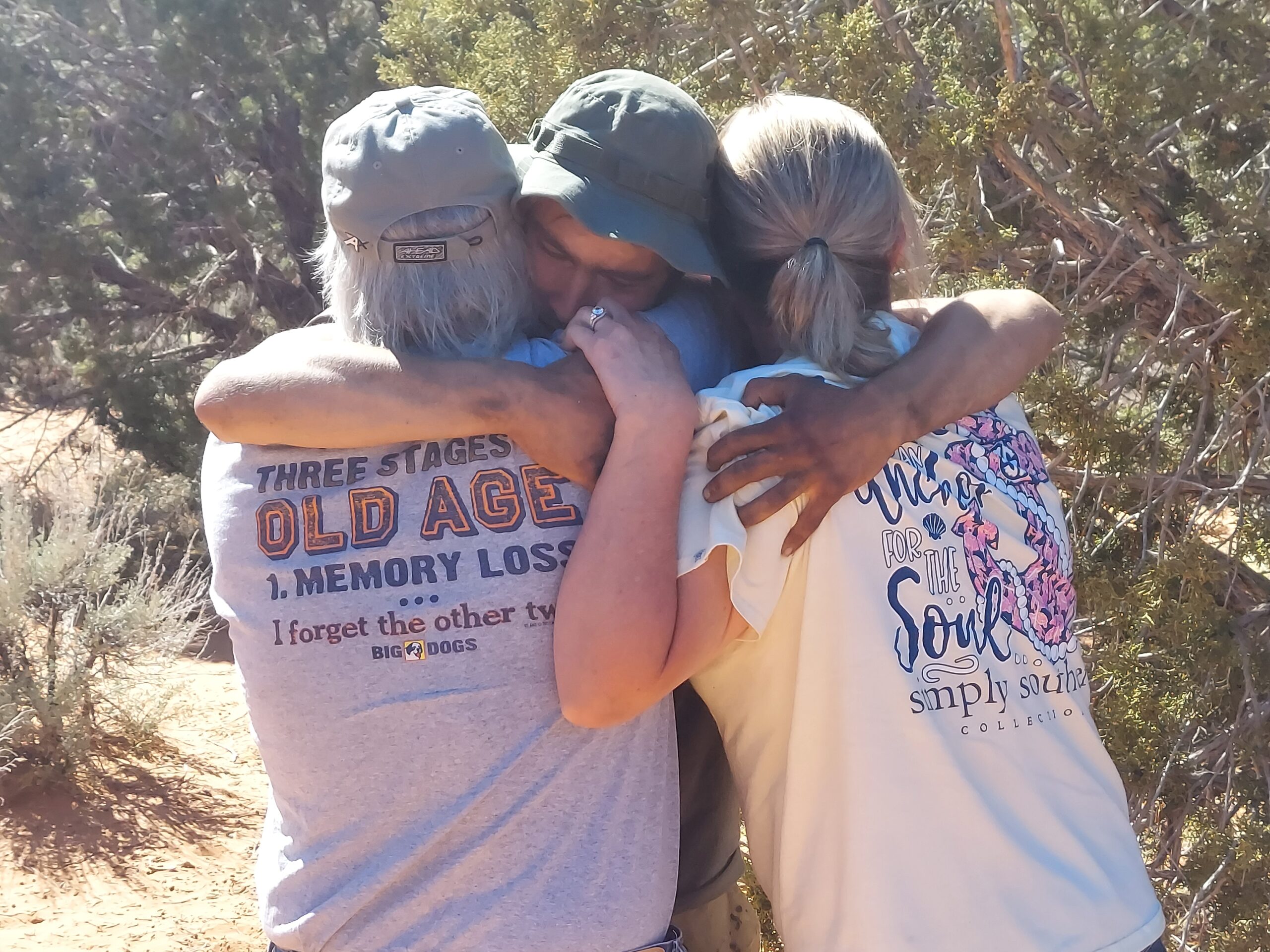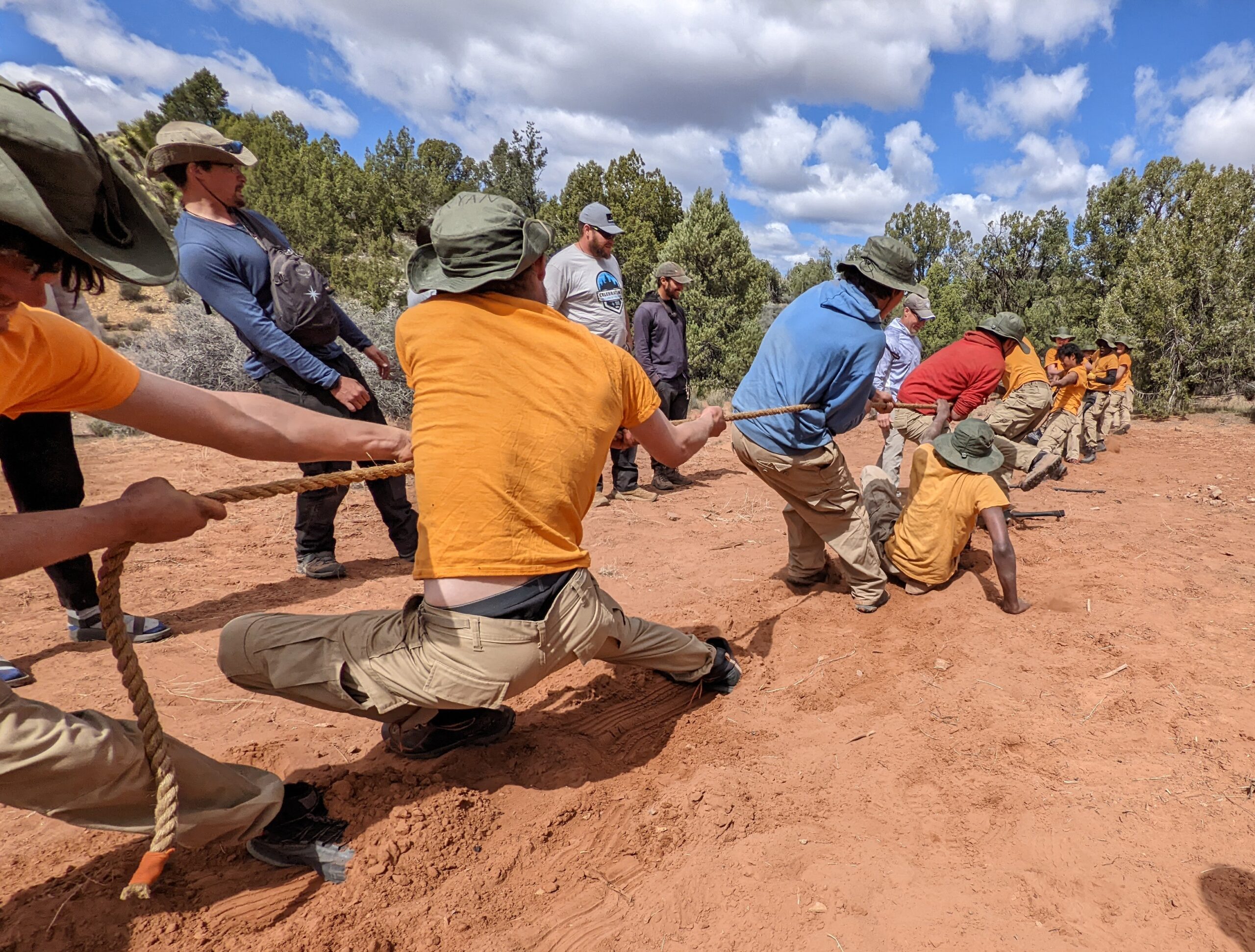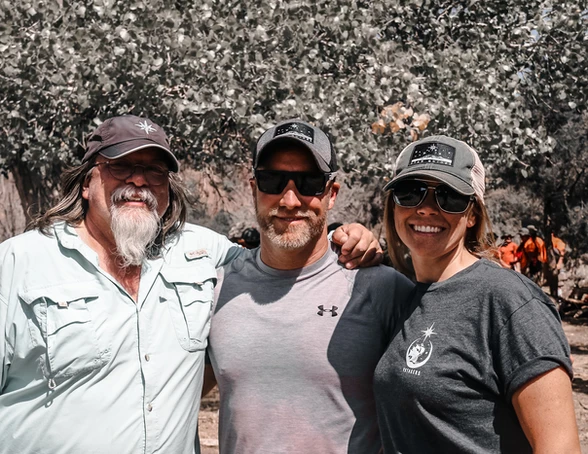STAR Guides Wilderness Therapy | safety
Student safety is our highest priority. Above everything else, we are 100% committed to ensuring the
well-being of our students in all aspects of their treatment experience. We recognize that authentic
therapeutic change only occurs when an individual feels safe, and their basic needs are met. We do not
use any form of deprivation to enforce compliance or to motivate change. Our treatment model does
not adhere to the notion of breaking clients down to build them up. Rather, our treatment model is
built on the concept of developing resilience and confidence.
- Every Star Guides student undergoes a comprehensive physical examination before entering the field.
- Students receive comprehensive medical assessments at intake and then every 14 days by our medical team.
- Students are trained to care for personal hygiene needs twice daily (before breakfast and dinner). Students take full body hygiene showers including hair washing twice weekly Students are provided a hot-water shower using a portable shower system every fourteen days.
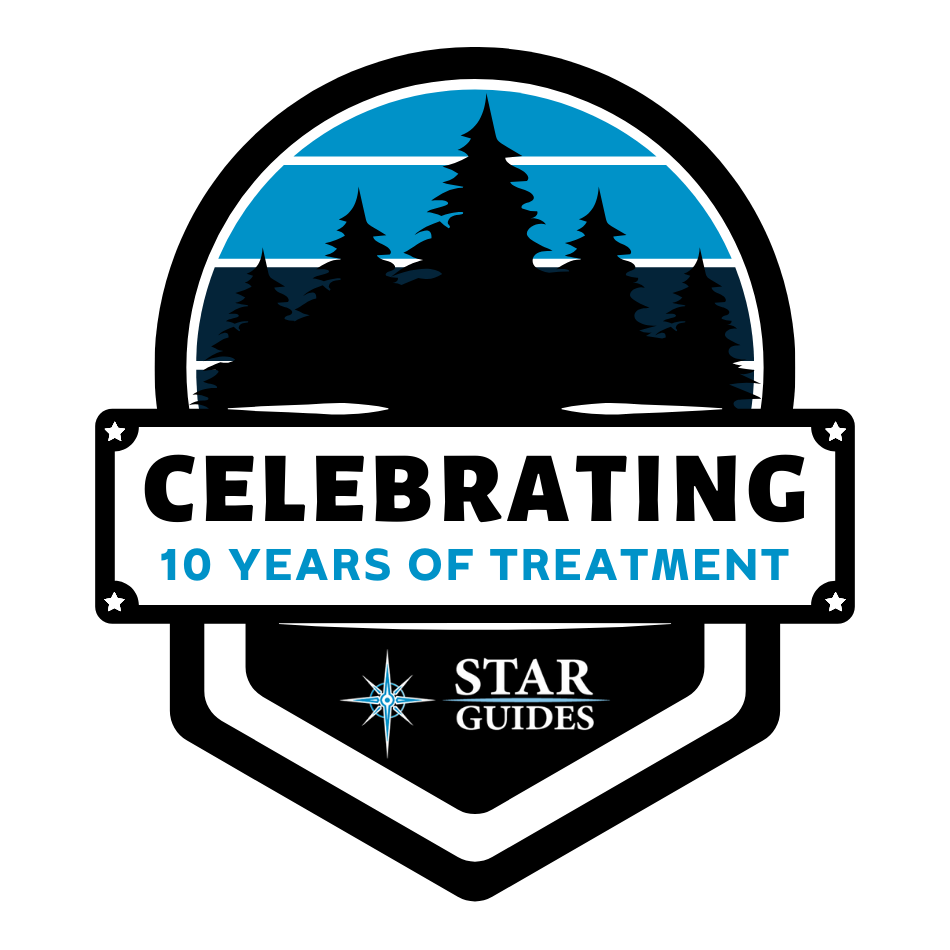
- All staff members undergo a formal screening and background checks (both State and Federal).
- Staff-to-student ratios meet or exceed state requirements.
- All our field instructors are certified in CPR and First Aid. All our Instructors are certified in crisis
- All our field instructors participate in weekly training sessions on clinical theory, crisis intervention,
medical intervention, licensing rules and regulations, and emergency preparedness.
- We utilize a treatment model that assures that a field director is always in the field, with access to the treatment groups and available for quick intervention and support for crisis situations.
- Each student is outfitted from head to toe with top-quality gear and clothing. Students are provided breakfast, lunch and dinner which includes a menu of fresh fruits, meats, vegetables, grains, nuts and a daily caloric intake between 3200 and 3500 calories along with safe water.
- Star Guides utilizes the most up to date communication technologies for communicating with our treatment groups including Garmin Dolorme GPS messaging devices, satellite phones, two-way radios (with company-owned and maintained repeaters), cell phones, and maintains 24-hour on-call supportstaff that provide logistic support to the treatment groups.
- In emergencies, Star Guides can easily access support from EMS (Emergency Medical Services).
- we transport culinary water from our office in St. George to the field utilizing a 500-gallon water trailer and our groups pull water each day from one of fifty-one 275-gallon water storage cubes strategically placed throughout the wilderness field allowing easy access to a clean and safe water supply.
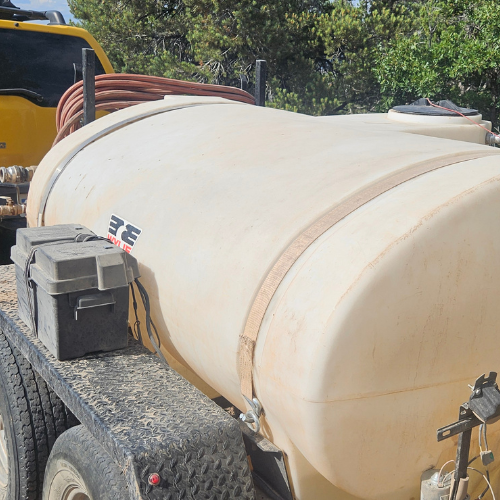

- Hydration requirements are strictly followed, which includes each student drinking at least three quarts of water daily during the cool months and four quarts of water during the hotter months.
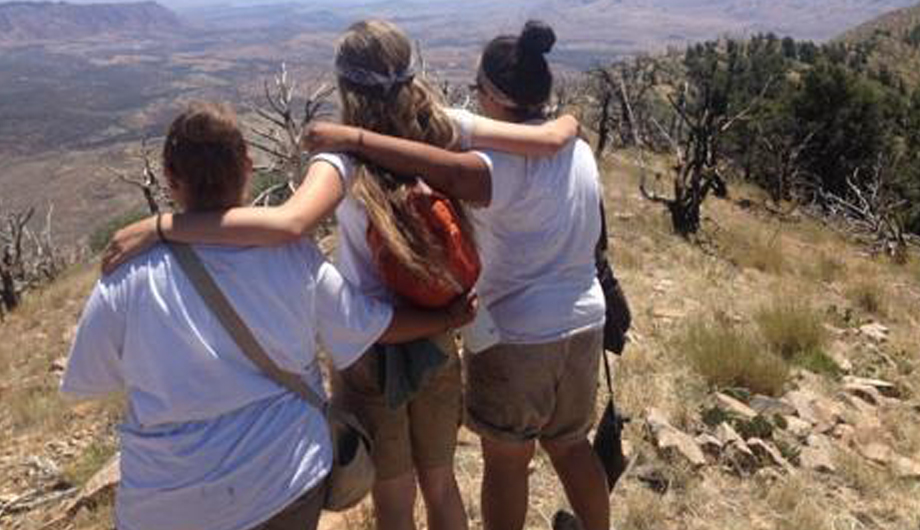
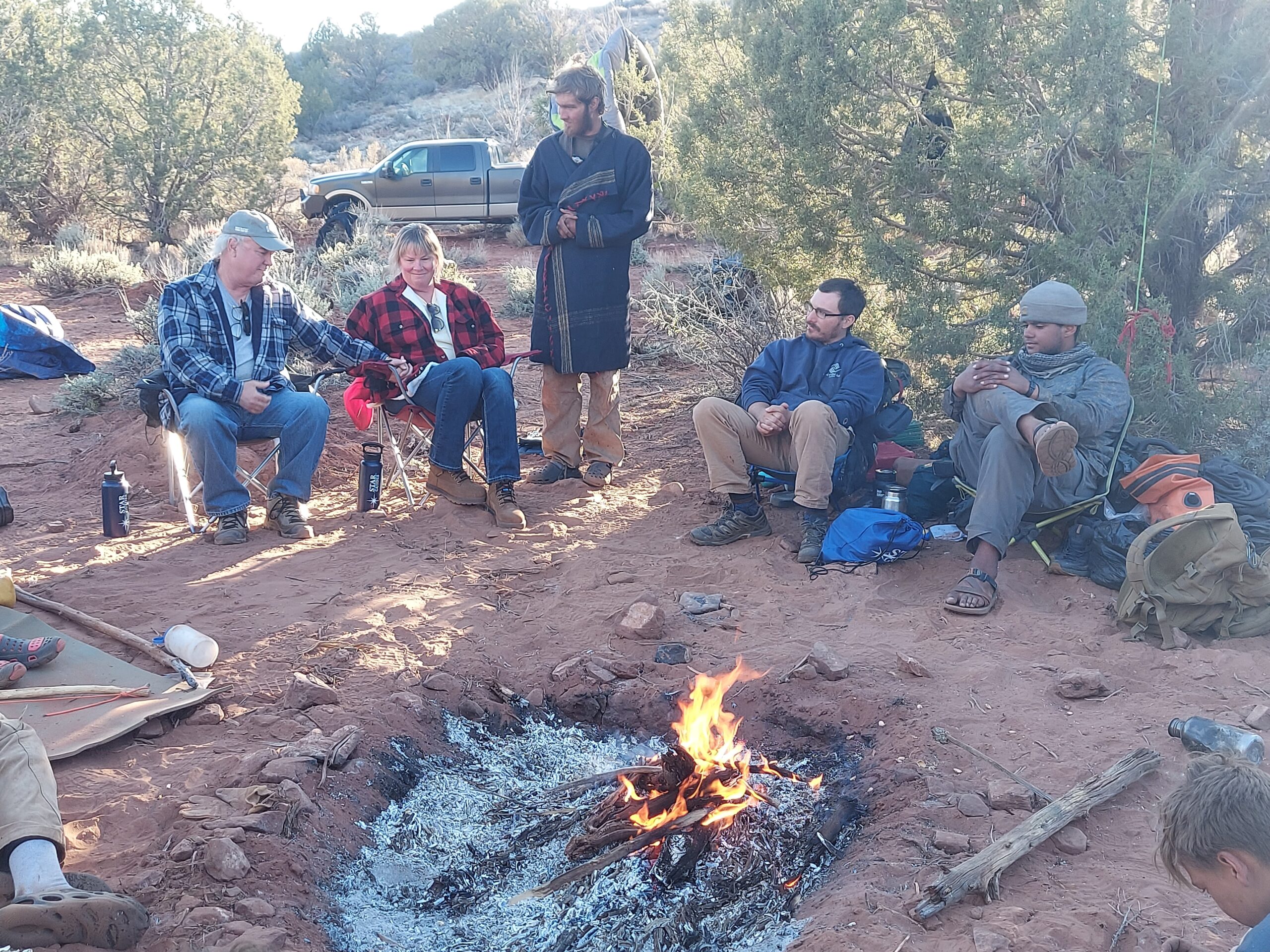
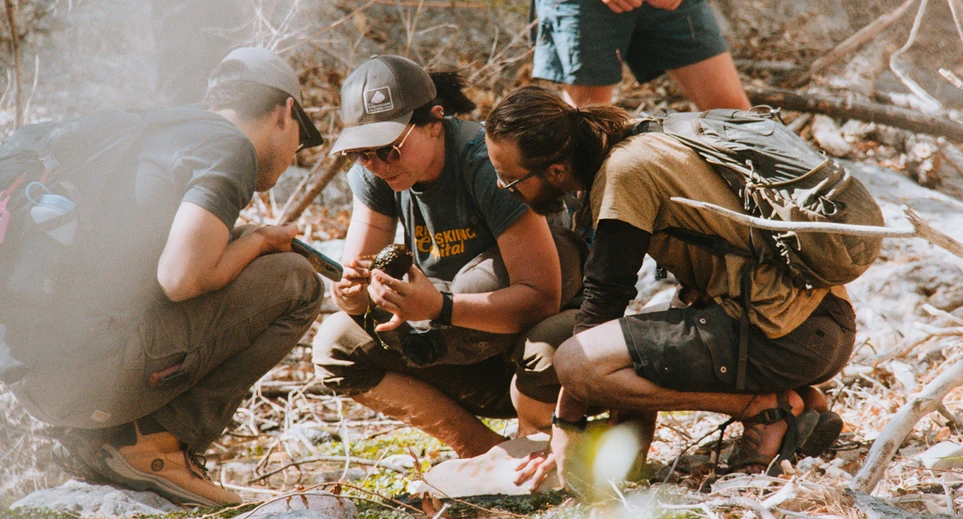
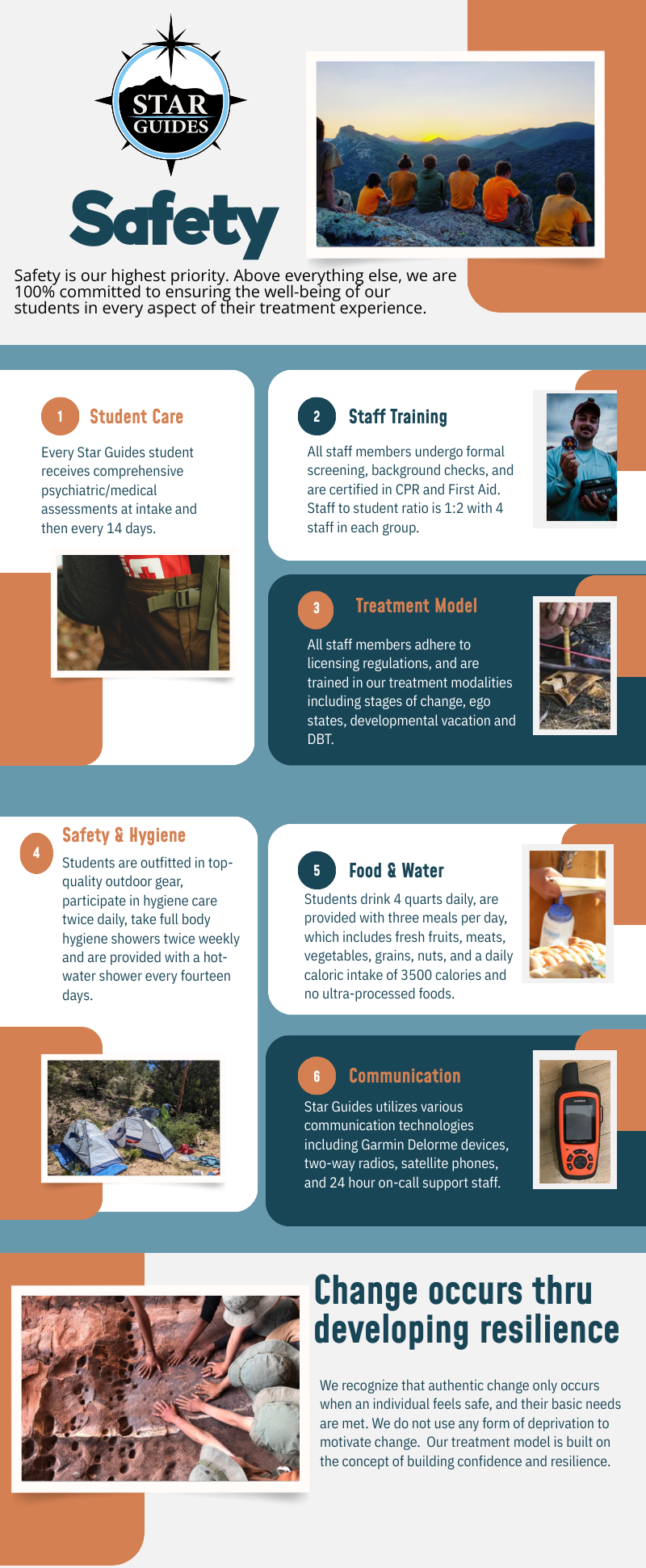
Frequently Asked Questions
What is the average length of stay in the program?
The program is designed to be a 120-150 day experience. Most youth are able to complete the requirements of the program and be eligible for a successful graduation from the program within this time frame. Students are provided a workbook and all the assignments needed to complete the program upon arrival. Each day, students are provided guidance and counsel from their instructors and therapists in completing the requirements. Students that are motivated to change their behaviors and to take accountability for their problems tend to move through the program more rapidly than those student who are resistant to the therapy and unmotivated to change their behaviors.
WILL I SPEAK WITH MY CHILD DURING HIS TIME IN THE FIELD?
Much of your communication with your student will occur through written letters. Students are provided with a notebook and pen to write letters whenever they want. All letters written by the student are sent via upload into your secure parent portal for your access.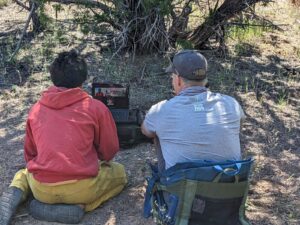 This typically occurs on Mondays and Thursdays. Parents are encouraged to work closely with their therapist in determining the content and frequency of letters sent to the student. As the student progresses and when the therapist deems it appropriate, family therapy sessions may occur via phone or Zoom using Starlink. Upon completion of the program, parents are invited to travel to Utah to participate in an overnight experience in the field with their student and to participate in a final face-to-face family therapy session.
This typically occurs on Mondays and Thursdays. Parents are encouraged to work closely with their therapist in determining the content and frequency of letters sent to the student. As the student progresses and when the therapist deems it appropriate, family therapy sessions may occur via phone or Zoom using Starlink. Upon completion of the program, parents are invited to travel to Utah to participate in an overnight experience in the field with their student and to participate in a final face-to-face family therapy session.
What does a typical day consist of?
Students are busy from the moment they wake up in the morning to the time they crawl into their sleeping bag after dark. Students learn to take responsibility for every aspect of their well-being while in the field. Each student learns to ration their own food, plan their own menu, cook each meal for themselves, clean their own pot after each meal, care for their own gear, set up their own shelter each night, complete their daily group chores and organize their time to complete the program assignments. 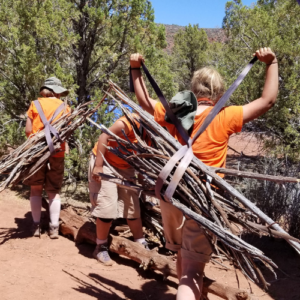 Whether it is digging a latrine, collecting firewood or hiking to a water source to collect water, students literally are engaged in positive, meaningful activity every waking second of their day. Students go to bed tired from a rigorous day of activity and rarely do we encounter students who have trouble sleeping because the demands of the program are so intense.
Whether it is digging a latrine, collecting firewood or hiking to a water source to collect water, students literally are engaged in positive, meaningful activity every waking second of their day. Students go to bed tired from a rigorous day of activity and rarely do we encounter students who have trouble sleeping because the demands of the program are so intense.
How far does a group hike each day?
Our groups hike to new campsites almost every day. These hikes can range from 2 to 8 miles per day. Hiking is an important aspect of the program because it provides students with the chance to push themselves physically and mentally. 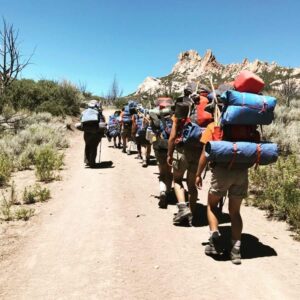 Learning to exercise and exert themselves physically allows youth to experience a “natural high” from the endorphins and neuro-chemicals the brain produces from physical exercise. Under the influence of this “natural high”, students learn to enjoy hiking as it provides them the opportunity to think and reflect on their situation. It also provides students the opportunity to explore the beautiful high desert and experience the beauty of nature.
Learning to exercise and exert themselves physically allows youth to experience a “natural high” from the endorphins and neuro-chemicals the brain produces from physical exercise. Under the influence of this “natural high”, students learn to enjoy hiking as it provides them the opportunity to think and reflect on their situation. It also provides students the opportunity to explore the beautiful high desert and experience the beauty of nature.
What do the youth eat while in the wilderness?
Students are required to consume a minimum of 3000 calories per day. The menu has been designed by a registered dietician and approved by the Utah State of Office of Licensing. Along with the simple nomadic nature of their wilderness experience the diet consists of rice, lentils, farina, oats, dried vegetables, dried beans, powdered milk, cheese, peanut butter, trail mix, canned tuna, chicken, turkey, fresh fruits and vegetables twice weekly. Students are provided new supplies of food on Mondays and Thursdays. They are taught how to plan a menu for themselves how to ration their food supplies between food drop days and how to cook meals with their food supplies on a camp fire. Students learn to become master chefs using their food supplies, a stainless steel cooking pot and a camp fire. It is amazing the tasty food they learn to cook from these basic staples. Students are able to earn spices and honey to add flavor to their food as they progress through the program.
DO THE GROUPS SLEEP IN TENTS OR UNDER THE STARS?
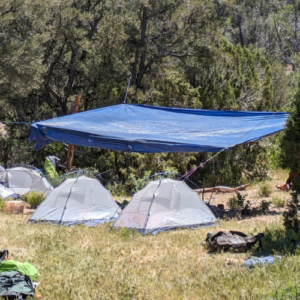 One of the program assignments includes students learning to identify a series of constellations. Each student is instructed on how to set up and care for an individual, personal one-person tent. Inside their own personal shelter, they use a mummy sleeping bag for warmth and protection from the elements. Traditional tents are far too heavy for backpacking in the remote wilderness, so we use light-weight one-person individualized tents. These tents serve as a protector from the elements allowing the students to remain dry and warm and providing a barrier and privacy from others.
One of the program assignments includes students learning to identify a series of constellations. Each student is instructed on how to set up and care for an individual, personal one-person tent. Inside their own personal shelter, they use a mummy sleeping bag for warmth and protection from the elements. Traditional tents are far too heavy for backpacking in the remote wilderness, so we use light-weight one-person individualized tents. These tents serve as a protector from the elements allowing the students to remain dry and warm and providing a barrier and privacy from others.How often will my child participate in therapy?
Students meet with their therapist in individual therapy sessions twice per week. Our therapists are in the field with students on Mondays and Thursdays. All of the therapy occurs in the wilderness seated around a fire or under the juniper and pine trees of the desert. This setting has a far deeper impact than office “couch” therapy for allowing students to students to “open up” and “get real” about their problems and issues. This is one of the many reasons why students can accomplish so much more in a wilderness setting than in an outpatient office or residential treatment setting. Nature is the perfect setting to allow youth the time to unplug from technology, step away from the noise of our current society and immerse themselves in an authentic journey of self-discovery and reset. Students also participate in daily group sessions where they process together with their instructors and fellow group members the issues that are imminent in the group setting and work on problem-solving and conflict-resolution skills.
What do the groups do when it rains or snows?
Our students are equipped with the highest quality outdoor gear to protect them from the elements and to assure their safety and comfort in the field. We issue gear based on the season and the conditions that our students encounter in the wilderness. Winter gear includes wind and moisture-protection parkas, gloves, boots, and layers of fleece to ensure protection from the cold. Our summer gear includes light clothing to allow for comfort and protection in the heat of the summer.
Regardless of the weather, students remain in the wilderness and learn to manage the challenges that accompany the weather. We believe there are important life lessons from dealing with weather-related problems that students face. Similar to the challenges faced in life, we can’t always control our environment, but we can control how we choose to respond to the environment and we can learn to approach all challenges with a positive attitude.
DO STUDENTS IN THE PROGRAM SHOWER?
Yes. Students are required to maintain good hygiene. Twice weekly, students take a “full body” shower by using water heated from the fire, placing the water in a portable water bladder and going off into the trees
privately, and using shampoo and soap to wash their hair and their bodies. On a twice-daily basis, morning and night, students are required to brush their teeth, brush their hair, wash their face and hands, and feet
with soap and water. About once per month, students have access to a heated portable shower that is brought in on a trailer that allows them to experience a “normal” shower while still in the field. Student clothing is laundered each week and students are provided clean clothes and back-up clothing to assist with maintaining hygiene and being comfortable while in the field.
HOW AM I KEPT UPDATED ABOUT MY STUDENTS PROGRESS IN THE PROGRAM?
Upon entering the program, students are assigned to a therapist who oversees all aspects of their treatment. This therapist functions as the parents’ liaison with their child while in the program. Parents have direct access to their therapist and can visit with him/her at any point via phone and email. Parents participate in a weekly parent Zoom or phone therapy session with the therapist and work closely with him/her in staying involved in the assessment and treatment process. Parents also receive twice weekly photos of their students in the field and receive written communication twice weekly from their students. Parents are provided twice weekly clinical progress reports from the staff in the field, medical assessment updates from the medical team, and phase work completion updates through the parent portal.
What is involved with the final two-day parent expedition at the conclusion of the program?
When your child has completed the requirements of the program, then you as parents are invited to travel to Utah to participate together with your child and the therapist in a family expedition. 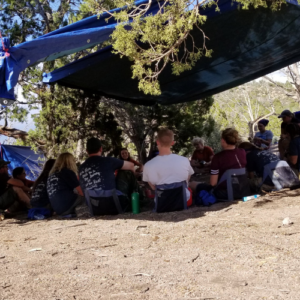 This two-day event allows the parents to experience wilderness living for themselves, to witness firsthand the progress that their child has made while in the program, and allows for the important process of family issues to occur in a therapeutic setting in the wilderness. Parents spend two days and one night in the wilderness. We provide all of the needed camping equipment and gear the parents need for this experience
This two-day event allows the parents to experience wilderness living for themselves, to witness firsthand the progress that their child has made while in the program, and allows for the important process of family issues to occur in a therapeutic setting in the wilderness. Parents spend two days and one night in the wilderness. We provide all of the needed camping equipment and gear the parents need for this experience
DOES MY CHILD RECEIVE MEDICAL CARE WHILE IN THE PROGRAM?
Yes. All students receive a comprehensive medical assessment upon arrival and prior to full participation in the program to assure they have the capacity to manage the demands of the program. Students are then
seen every two weeks by our medical team to assure their safety and physical well-being while in the program. Students who are on medications continue to receive their medications as prescribed by the physician and our medical team can make adjustments to student medications as needed. A medical report summarizing student health, medications, etc. is posted in the portal every two weeks to keep parents updated on their student’s health.
What does the program curriculum consist of?
To achieve a successful completion of the program, students are required to complete each of the assignments in the six phases of the program. These assignments consist of a combination of therapeutic tasks and wilderness skills. Therapy tasks include writing and sharing of an autobiography, working through past traumas, developing resiliency skills, compiling a sexual history, participating in and leading group therapy sessions, establishing written correspondence, and family work with parents and accountability groups. Wilderness skills include learning to build a bow drill fire, constellation identification, plant identification, rolling survival packs, building shelters, learning knots, building traps, cooking on a fire, hiking, building traps, etc.
Can youth involved in the court system participate in the program?
Yes. We work closely with courts and probation departments for youth who are facing legal problems. We have worked with courts and probation departments from many parts of the country. Oftentimes, the court or probation department will request regular updates on the progress of their client in the program. Our therapists can provide weekly written or verbal updates to third parties involved in the case. Oftentimes, courts request that youth submit to a psycho-sexual evaluation. Youth at STAR Guides Treatment Centers can complete this assessment while they are in the program and this report can be provided to the court. STAR Guides Treatment Centers serve as a great alternative to government-run sexual offense treatment programs.
Coming to STAR Guides Treatment Centers and submitting to a psycho-sexual assessment can be helpful to the legal process as it allows the parties involved to receive and review the assessment report which can assist in determining the treatment and supervision needs of the youth.
Is STAR Guides Treatment Centers a licensed treatment facility?
Yes. STAR Guides Treatment Centers is licensed and registered as an outdoor youth treatment program by the State of Utah Department of Human Services Office  of Licensing. Wilderness Treatment programs are subject to very strict State licensing regulations and Star Guides strictly adheres to all rules and regulations outlined by the State of Utah as well as being accredited by the Joint Commission. (JACHO). Each of the STAR Guides clinicians are Utah Licensed Psychologist or Psychotherapist and maintain active licenses with the Utah Division of Occupational and Professional Licensing.
of Licensing. Wilderness Treatment programs are subject to very strict State licensing regulations and Star Guides strictly adheres to all rules and regulations outlined by the State of Utah as well as being accredited by the Joint Commission. (JACHO). Each of the STAR Guides clinicians are Utah Licensed Psychologist or Psychotherapist and maintain active licenses with the Utah Division of Occupational and Professional Licensing.
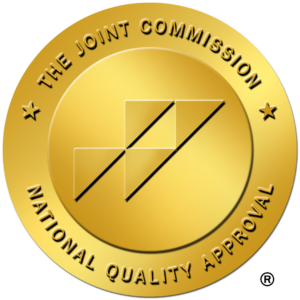
STAR Guides operates on lands managed by the Federal Government and holds a special recreation permit issued by the Bureau of Land Management. STAR Guides adheres to strict land use regulations set forth by the federal government as well for maintaining this permit.
ARE TREATMENT GROUPS SAME GENDER OR CO-ED?
Our treatment groups are same gender only. Currently we only offer male groups. Our treatment groups function as a micro-community completely independent of one another and our groups don’t ever interact or meet together. A typical treatment group ranges between 6-8 students at a time. Our groups are always staffed with a 1 to 3 ratio with a minimum of three field instructors in each group. Because we keep our group sizes small, students receive highly individualized attention and supervision. Students get to know their field instructors well and benefit from the mentoring and coaching provided by their field instructors.
Does the program include a school component?
What is the average length of stay in the program?
The program is designed to be a 120-150 day experience. Most youth are able to complete the requirements of the program and be eligible for a successful graduation from the program within this time frame. Students are provided a workbook and all the assignments needed to complete the program upon arrival. Each day, students are provided guidance and counsel from their instructors and therapists in completing the requirements. Students that are motivated to change their behaviors and to take accountability for their problems tend to move through the program more rapidly than those student who are resistant to the therapy and unmotivated to change their behaviors.
WILL I SPEAK WITH MY CHILD DURING HIS TIME IN THE FIELD?
Much of your communication with your student will occur through written letters. Students are provided with a notebook and pen to write letters whenever they want. All letters written by the student are sent via upload
into your secure parent portal for your access. This typically occurs on Mondays and Thursdays. Parents are encouraged to work closely with their therapist in determining the content and frequency of letters sent to the student. As the student progresses and when the therapist deems it appropriate, family therapy sessions may occur via phone or Zoom using Starlink. Upon completion of the program, parents are invited to travel to Utah to participate in an overnight experience in the field with their student and to participate in a final face-to-face family therapy session.
What does a typical day consist of?
Students are busy from the moment they wake up in the morning to the time they crawl into their sleeping bag after dark. Students learn to take responsibility for every aspect of their well-being while in the field. Each student learns to ration their own food, plan their own menu, cook each meal for themselves, clean their own pot after each meal, care for their own gear, set up their own shelter each night, complete their daily group chores and organize their time to complete the program assignments. Whether it is digging a latrine, collecting firewood or hiking to a water source to collect water, students literally are engaged in positive, meaningful activity every waking second of their day. Students go to bed tired from a rigorous day of activity and rarely do we encounter students who have trouble sleeping because the demands of the program are so intense.
How far does a group hike each day?
Our groups hike to new campsites almost every day. These hikes can range from 2 to 8 miles per day. Hiking is an important aspect of the program because it provides students with the chance to push themselves physically and mentally. Learning to exercise and exert themselves physically allows youth to experience a “natural high” from the endorphins and neuro-chemicals the brain produces from physical exercise. Under the influence of this “natural high”, students learn to enjoy hiking as it provides them the opportunity to think and reflect on their situation. It also provides students the opportunity to explore the beautiful high desert and experience the beauty of nature.
What do the youth eat while in the wilderness?
Students are required to consume a minimum of 3000 calories per day. The menu has been designed by a registered dietician and approved by the Utah State of Office of Licensing. Along with the simple nomadic nature of their wilderness experience the diet consists of rice, lentils, farina, oats, dried vegetables, dried beans, powdered milk, cheese, peanut butter, trail mix, canned tuna, chicken, turkey, fresh fruits and vegetables twice weekly. Students are provided new supplies of food on Mondays and Thursdays. They are taught how to plan a menu for themselves how to ration their food supplies between food drop days and how to cook meals with their food supplies on a camp fire. Students learn to become master chefs using their food supplies, a stainless steel cooking pot and a camp fire. It is amazing the tasty food they learn to cook from these basic staples. Students are able to earn spices and honey to add flavor to their food as they progress through the program.
DO THE GROUPS SLEEP IN TENTS OR UNDER THE STARS?
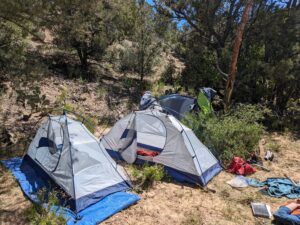
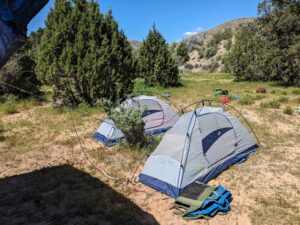
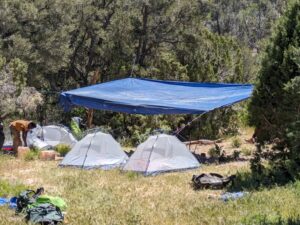
How often will my child participate in therapy?
Students meet with their therapist in individual therapy sessions twice per week. Our therapists are in the field with students on Mondays and Thursdays. All of the therapy occurs in the wilderness seated around a fire or under the juniper and pine trees of the desert. This setting has a far deeper impact than office “couch” therapy for allowing students to students to “open up” and “get real” about their problems and issues. This is one of the many reasons why students can accomplish so much more in a wilderness setting than in an outpatient office or residential treatment setting. Nature is the perfect setting to allow youth the time to unplug from technology, step away from the noise of our current society and immerse themselves in an authentic journey of self-discovery and reset. Students also participate in daily group sessions where they process together with their instructors and fellow group members the issues that are imminent in the group setting and work on problem-solving and conflict-resolution skills.
What do the groups do when it rains or snows?
Our students are equipped with the highest quality outdoor gear to protect them from the elements and to assure their safety and comfort in the field. We issue gear based on the season and the conditions that our students encounter in the wilderness. Winter gear includes wind and moisture-protection parkas, gloves, boots, and layers of fleece to ensure protection from the cold. Our summer gear includes light clothing to allow for comfort and protection in the heat of the summer.
Regardless of the weather, students remain in the wilderness and learn to manage the challenges that accompany the weather. We believe there are important life lessons from dealing with weather-related problems that students face. Similar to the challenges faced in life, we can’t always control our environment, but we can control how we choose to respond to the environment and we can learn to approach all challenges with a positive attitude.
DO STUDENTS IN THE PROGRAM SHOWER?
Yes. Students are required to maintain good hygiene. Twice weekly, students take a “full body” shower by using water heated from the fire, placing the water in a portable water bladder and going off into the trees
privately, and using shampoo and soap to wash their hair and their bodies. On a twice-daily basis, morning and night, students are required to brush their teeth, brush their hair, wash their face and hands, and feet
with soap and water. About once per month, students have access to a heated portable shower that is brought in on a trailer that allows them to experience a “normal” shower while still in the field. Student clothing is laundered each week and students are provided clean clothes and back-up clothing to assist with maintaining hygiene and being comfortable while in the field.
HOW AM I KEPT UPDATED ABOUT MY STUDENTS PROGRESS IN THE PROGRAM?
Upon entering the program, students are assigned to a therapist who oversees all aspects of their treatment. This therapist functions as the parents’ liaison with their child while in the program. Parents have direct access to their therapist and can visit with him/her at any point via phone and email. Parents participate in a weekly parent Zoom or phone therapy session with the therapist and work closely with him/her in staying involved in the assessment and treatment process. Parents also receive twice weekly photos of their students in the field and receive written communication twice weekly from their students. Parents are provided twice weekly clinical progress reports from the staff in the field, medical assessment updates from the medical team, and phase work completion updates through the parent portal.
What is involved with the final two-day parent expedition at the conclusion of the program?
When your child has completed the requirements of the program, then you as parents are invited to travel to Utah to participate together with your child and the therapist in a family expedition. This two-day event allows the parents to experience wilderness living for themselves, to witness firsthand the progress that their child has made while in the program, and allows for the important process of family issues to occur in a therapeutic setting in the wilderness. Parents spend two days and one night in the wilderness. We provide all of the needed camping equipment and gear the parents need for this experience.
DOES MY CHILD RECEIVE MEDICAL CARE WHILE IN THE PROGRAM?
Yes. All students receive a comprehensive medical assessment upon arrival and prior to full participation in the program to assure they have the capacity to manage the demands of the program. Students are then
seen every two weeks by our medical team to assure their safety and physical well-being while in the program. Students who are on medications continue to receive their medications as prescribed by the physician and our medical team can make adjustments to student medications as needed. A medical report summarizing student health, medications, etc. is posted in the portal every two weeks to keep parents updated on their student’s health.
What does the program curriculum consist of?
To achieve a successful completion of the program, students are required to complete each of the assignments in the six phases of the program. These assignments consist of a combination of therapeutic tasks and wilderness skills. Therapy tasks include writing and sharing of an autobiography, working through past traumas, developing resiliency skills, compiling a sexual history, participating in and leading group therapy sessions, establishing written correspondence, and family work with parents and accountability groups. Wilderness skills include learning to build a bow drill fire, constellation identification, plant identification, rolling survival packs, building shelters, learning knots, building traps, cooking on a fire, hiking, building traps, etc.
Can youth involved in the court system participate in the program?
Yes. We work closely with courts and probation departments for youth who are facing legal problems. We have worked with courts and probation departments from many parts of the country. Oftentimes, the court or probation department will request regular updates on the progress of their client in the program. Our therapists can provide weekly written or verbal updates to third parties involved in the case. Oftentimes, courts request that youth submit to a psycho-sexual evaluation. Youth at STAR Guides Treatment Centers can complete this assessment while they are in the program and this report can be provided to the court. STAR Guides Treatment Centers serve as a great alternative to government-run sexual offense treatment programs.
Coming to STAR Guides Treatment Centers and submitting to a psycho-sexual assessment can be helpful to the legal process as it allows the parties involved to receive and review the assessment report which can assist in determining the treatment and supervision needs of the youth.
Is STAR Guides Treatment Centers a licensed treatment facility?
Yes. STAR Guides Treatment Centers is licensed and registered as an outdoor youth treatment program by the State of Utah Department of Human Services Office of Licensing. Wilderness Treatment programs are subject to very strict State licensing regulations and Star Guides strictly adheres to all rules and regulations outlined by the State of Utah as well as being accredited by the Joint Commission. (JACHO). Each of the STAR Guides clinicians are Utah Licensed Psychologist or Psychotherapist and maintain active licenses with the Utah Division of Occupational and Professional Licensing.
STAR Guides operates on lands managed by the Federal Government and holds a special recreation permit issued by the Bureau of Land Management. STAR Guides adheres to strict land use regulations set forth by the federal government as well for maintaining this permit.
ARE TREATMENT GROUPS SAME GENDER OR CO-ED?
Our treatment groups are same gender only. Currently we only offer male groups. Our treatment groups function as a micro-community completely independent of one another and our groups don’t ever interact or meet together. A typical treatment group ranges between 6-8 students at a time. Our groups are always staffed with a 1 to 3 ratio with a minimum of three field instructors in each group. Because we keep our group sizes small, students receive highly individualized attention and supervision. Students get to know their field instructors well and benefit from the mentoring and coaching provided by their field instructors.
Does the program include a school component?
ACCREDITATIONS, AFFILIATIONS AND PARTNERS






